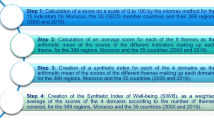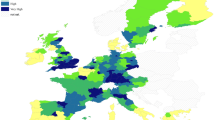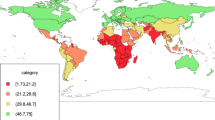Abstract
This paper analyses the inequality between the regions of the Organization for Economic Co-operation and Development (OECD) member countries by using stochastic multi-objective acceptability analysis and the associated multivariate Gini index. By considering a large number of possible combinations of weights, the distribution of the potential rankings for each region is used to measure multidimensional inequality both within and between countries. Our results show that beyond the expected two clubs of rich and poor countries, a third group of countries emerges that belongs neither to the top nor to the bottom of the ranking, an outcome that can be attributed to the presence of significant economic differences among regions within those countries. Most of the inequality lies between countries, but regional well-being also significantly varies within the same countries and we find an inverse U-shape connection between regional well-being and its inequality within the OECD member countries.
Similar content being viewed by others
References
Alesina, A., Rodrik, D.: Distributive politics and economic growth. Q. J. Econ. 104, 465–490 (1994)
Angilella, S., Bottero, M., Corrente, S., Ferretti, V., Greco, S., Lami, I.M.: Non-additive robust ordinal regression for urban and territorial planning: an application for siting an urban waste landfill. Ann. Oper. Res. 245, 1–30 (2016)
Bleys, B.: Beyond GDP: classifying alternative measures for Progress. Soc. Indic. Res. 109, 355–376 (2012)
Bourguignon, F., Morrisson, C.: Inequality and development: the role of dualism. J. Dev. Econ. 57(2), 233–257 (1998)
Castilla, C.: Subjective well-being and reference-dependence: insights from Mexico. J. Econ. Inequal. 10(2), 219–238 (2012)
Cherchye, L., Moesen, W., Rogge, N., Van Puyenbroeck, T.: An introduction to ‘benefit of the doubt’ composite indicators. Soc. Indic. Res. 82(1), 111–145 (2007)
Chowdhury, S., Squire, L.: Setting weights for aggregate indices: an application to the commitment to development index and human development index. J. Dev. Stud. 42(5), 761–771 (2006)
Clark, A.E., Flèche, S., Senik, C.: Economic growth evens out happiness: evidence from six surveys. Rev. Income Wealth. 62(3), 405–419 (2016)
Clarke, G.: More evidence on income distribution and growth. J. Dev. Econ. 47, 403–428 (1995)
Coco, G., Lagravinese, R., Resce, G.: Beyond the weights: a multicriteria approach to evaluate inequality in education. J. Econ. Inequal. 18(4), 469–489 (2020)
Costanza, R., Kubiszewski, I., Giovannini, E., Lovins, H., McGlade, J., Pickett, K.E., Ragnarsdóttir, K.V., Roberts, D., de Vogli, R., Wilkinson, R.: Development. Nature. 505(7483), 283–285 (2014)
Costanza, R., Daly, L., Fioramonti, L., Giovannini, E., Kubiszewski, I., Mortensen, L.F., Pickett, K.E., Ragnarsdottir, K.V., de Vogli, R., Wilkinson, R.: Modelling and measuring sustainable wellbeing in connection with the UN sustainable development goals. EcologicalEconomics. 130, 350–355 (2016)
De Beukelaer, C.: Gross domestic problem: the politics behind the World's Most powerful number. J. Hum. Dev. Capab. 15(2–3), 290–291 (2014)
Decancq, K.: Measuring multidimensional inequality in the OECD member countries with a distribution-sensitive better life index. Soc. Indic. Res. 131(3), 1057–1086 (2017)
Decancq, K., Lugo, M.A.: Weights in multidimensional indices of wellbeing: an overview. Econ. Rev. 32(1), 7–34 (2013)
Decancq, K., Schokkaert, E.: Beyond GDP: measuring social progress in Europe. Soc. Indic. Res. 126, 21–55 (2016)
Döpke, J., Knabe, A., Lang, C., Maschke, P.: Multidimensional well-being and regional disparities in Europe. J. Common Mark. Stud. 55, 1026–1044 (2017)
Durand, M.: The OECD better life initiative: How's life? and the measurement of well-being. Rev. Income Wealth. 61(1), 4–17 (2015)
Easterlin, R.A.: Does economic growth improve the human lot? Some empirical evidence. Nations Households Econ. Growth. 89, 89–125 (1974)
Esteban, J.M., Ray, D.: On the measurement of polarization. Econometrica. 62(4), 819–851 (1994)
Fields, G.: A welfare economic approach to growth and distribution in the dual economy. Q. J. Econ. 93, 325–353 (1979)
Fishman, G.: Monte Carlo: Concepts, Algorithms, and Applications. Springer Science & Business Media (2013)
Fleurbaey, M.: Beyond GDP: the quest for a measure of social welfare. J. Econ. Lit. 47, 1029–1075 (2009)
Frey, B.S., Stutzer, A.: Happiness and public choice. Public Choice. 144(3–4), 557–573 (2010)
Frey, B.S., Luechinger, S., Stutzer, A.: The life satisfaction approach to valuing public goods: the case of terrorism. Public Choice. 138(3–4), 317–345 (2009)
Greco, S., Ishizaka, A., Matarazzo, B., Torrisi, G.: Stochastic multi-attribute acceptability analysis (SMAA): an application to the ranking of Italian regions. Reg. Stud. 52(4), 585–600 (2018)
Greco, S., Ishizaka, A., Tasiou, M., Torrisi, G.: On the methodological framework of composite indices: A review of the issues of weighting, aggregation, and robustness. Soc. Indic. Res. 141(1), 61–94 (2019)
Helliwell, J.F.: How's life? Combining individual and national variables to explain subjective well-being. Econ. Model. 20(2), 331–360 (2003)
Helliwell, J.F., Barrington-Leigh, C.P.: Viewpoint: measuring and understanding subjective well-being. Can. J, Econ./Revue canadienned'économique. 43(3), 729–753 (2010)
Hooghe, L., Marks, G., Schakel, A.H., Osterkatz, S.C., Niedzwiecki, S., Shair-Rosenfield, S.: Measuring Regional Authority: A Postfunctionalist Theory of Governance, vol. I. Oxford University Press (2016)
Iammarino, S., Rodríguez-Pose, A., Storper, M.: Regional inequality in europe: evidence,theory and policy implications. J. Econ. Geogr. 19(2), 273–298 (2019)
Ifcher, J., Zarghamee, H., Graham, C.: Income inequality and well-being in the US: evidence of geographic-scale-and measure-dependence. J. Econ. Inequal. 17(3), 415–434 (2019)
Inglehart, R., Foa, R., Peterson, C., Welzel, C.: Development, freedom, and rising happiness: A global perspective (1981–2007). Perspect. Psychol. Sci. 3(4), 264–285 (2008)
INSEE: Stiglitz Report: the French National Statistical Agenda. INSEE, Paris (2010)
ISTAT, CNEL: Il benessere equo e sostenibile in Italia. ISTAT, Roma (2013)
Jordá, V., Sarabia, J.M.: International convergence in well-being indicators. Soc. Indic. Res. 120(1), 1–27 (2015)
Klasen, S.: Measuring poverty and deprivation in South Africa. Rev. Income Wealth. 46(1), 33–58 (2000)
Knight, J.: Explaining income distribution in less developed countries: a framework and an agenda. Oxf. Bull. Econ. Stat. 38, 161–177 (1976)
Krishnakumar, J., Nagar, A.L.: On exact statistical properties of multidimensional indices based on principal components, factor analysis, MIMIC and structural equation models. Soc. Indic. Res. 86(3), 481–496 (2008)
Krugman, P.: Increasing returns and economic geography. J. Polit. Econ. 99(3), 483–499 (1991)
Kuznets, S.: Economic growth and income inequality. Am. Econ. Rev. 45(1), 1–28 (1955)
Lagravinese, R., Liberati, P., Resce, G.: Exploring health outcomes by stochastic multicriteria acceptability analysis: an application to Italian regions. Eur. J. Oper. Res. 274, 1168–1179 (2019)
Lagravinese, R., Liberati, P., Sacchi, A.: The growth and variability of regional taxes: an application to Italy. Reg. Stud. 52(3), 416–429 (2018)
Lahdelma, R., Hokkanen, J., Salminen, P.: SMAA-stochastic multiobjective acceptability analysis. Eur. J. Oper. Res. 106(1), 137–143 (1998)
Lahdelma, R., Salminen, P.: SMAA-2: stochastic multicriteria acceptability analysis for group decision making. Oper. Res. 49(3), 444–454 (2001)
Liberati, P.: The world distribution of income and its inequality, 1970–2009. Rev. Income Wealth. 61(2), 248–273 (2015)
McGraw, K.O., Wong, S.P.: Forming inferences about some intraclass correlation coefficients. Psychol. Methods. 1, 30–46 (1996)
Milton, J.S., Arnold, J.C.: Introduction to Probability and Statistics, vol. 4. McGraw-Hill, New York (1990)
Murias, P., Novello, S., Martínez-Roget, F.: A Malmquist-based approach to change in local economic well-being. Reg. Stud. 50(8), 1273–1289 (2016)
Nardo, M., Saisana, M., Saltelli, A., Tarantola, S., Hoffman, A., Giovannini, E.: Handbook on Constructing Composite Indicators. OECD-JRC, Paris (2008)
Noorbakhsh, F.: The human development index: some technical issues and alternative indices. J. Int. Dev. 10(5), 589–605 (1998)
OECD: How's Life in your Region?: Measuring Regional and Local Well-Being for Policy Making. OECD Publishing, Paris (2014)
OECD: How's Life? 2016 - Measuring Well-Being. OECD Publishing, Paris (2016a)
OECD: OECD Regions at a Glance 2016. OECD Publishing, Paris (2016b)
OECD: OECD Regions at a Glance 2016, Technical Report. OECD Publishing, Paris (2016c)
ONS: Measuring What Matters, National Statistician’s Reflections on the National Debate on Measuring National Well-Being. Office of National Statistics, UK (2011)
Osberg, L., Sharpe, A.: How should we measure the “economic” aspects of well-being? Rev. Income Wealth. 51(2), 311–336 (2005)
Patrizii, V., Pettini, A., Resce, G.: The cost of well-being. Soc. Indic. Res. 133(3), 985–1010 (2017)
Peiró-Palomino, J.: Regional well-being in the OECD. J. Econ. Inequal. 17(2), 195–218 (2019)
Peiró-Palomino, J., Picazo-Tadeo, A.J.: OECD: one or many? Ranking countries with a composite well-being indicator. Soc. Indic. Res. 139(3), 847–869 (2018)
Peiró-Palomino, J., Picazo-Tadeo, A. J., & Rios, V.: Well-being in European regions: does government quality matter?. Pap. Reg. Sci. 99(3), 555–582 (2020)
Persson, T., Tabellini, G.: Is inequality harmful to growth? Am. Econ. Rev. 84, 600–621 (1994)
Pyatt, G.: On the interpretation and disaggregation of Gini coefficients. Econ. J. 86(342), 243–255 (1976)
Quah, D.T.: Twin peaks: growth and convergence in models of distribution dynamics. Econ. J. 106(437), 1045–1055 (1996)
Ravallion, M.: Good and bad growth: the human development reports. World Dev. 25(5), 631–638 (1997)
Resce, G., Schiltz, F.: Sustainable development in Europe: A multicriteria decision analysis. Rev. Income Wealth. 67(2), 509–529 (2021)
Robinson, S.: A note on the U hypothesis relating income inequality and economic development. Am. Econ. Rev. 66, 437–440 (1976)
Savaglio, E.: Three approaches to the analysis of multidimensional inequality. In: Farina, F., Savaglio, E. (eds.) Inequality and Economic Integration, pp. 264–277. Routledge, London (2006)
Sen, A.: Commodities and Capabilities. North-Holland Publishing, Amsterdam (1985)
Shrout, P.E., Fleiss, J.L.: Intraclass correlations: uses in assessing rater reliability. Psychol. Bull. 86, 420–428 (1979)
Stiglitz, J.E., Sen, A., Fitoussi, J.P.: Report by the Commission on the Measurement of Economic Performance and Social Progress. Commission on the Measurement of Economic Performance and Social Progress, Paris (2010)
Teorell, J., Dahlberg, S., Holmberg, S., Rothstein, B., Pachon, N.A., Axelsson, S.: The Quality of Government Standard Dataset, version Jan20. University of Gothenburg: The Quality of Government Institute. (2020) http://www.qog.pol.gu.sehttps://doi.org/10.18157/qogstdjan20
Tervonen, T., Lahdelma, R.: Implementing stochastic multicriteria acceptability analysis. Eur. J. Oper. Res. 178(2), 500–513 (2007)
UNDP (1996) Human Development Report. United Nation Development Programme, Nairobi, Kenia
Walheer, B.: Growth and convergence of the OECD countries: A multi-sector production-frontier approach. Eur. J. Oper. Res. 252(2), 665–675 (2016)
Weymark, J.A.: The normative approach to the measurement of multidimensional inequality. In: Farina, F., Savaglio, E. (eds.) Inequality and Economic Integration, pp. 303–328. Routledge, London (2006)
Wolak, M.E., Fairbairn, D.J., Paulsen, Y.R.: Guidelines for estimating repeatability. Methods Ecol. Evol. 3(1), 129–137 (2012)
Yitzhaki, S.: Economic distance and overlapping of distributions. J. Econ. 61(1), 147–159 (1994)
Yitzhaki, S., Lerman, R.: Income stratification and income inequality. Rev. Income Wealth 37, 313–329 (1991)
Data Availability Statement
The data that support the findings of this study are available from the corresponding author upon request.
Author information
Authors and Affiliations
Corresponding author
Ethics declarations
Conflict of Interest/Competing Interest
All authors declare no conflict of interest.
Additional information
Publisher’s Note
Springer Nature remains neutral with regard to jurisdictional claims in published maps and institutional affiliations.
Supplementary Information
ESM 1
(DOCX 38 kb)
Rights and permissions
About this article
Cite this article
Liberati, P., Resce, G. Regional Well-Being and its Inequality in the OECD Member Countries. J Econ Inequal 20, 671–700 (2022). https://doi.org/10.1007/s10888-021-09521-7
Received:
Accepted:
Published:
Issue Date:
DOI: https://doi.org/10.1007/s10888-021-09521-7




